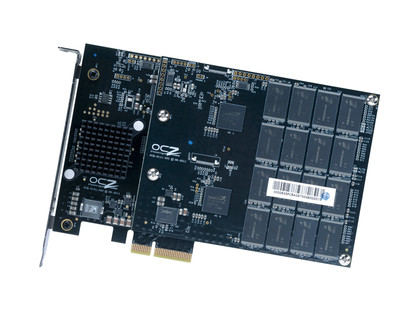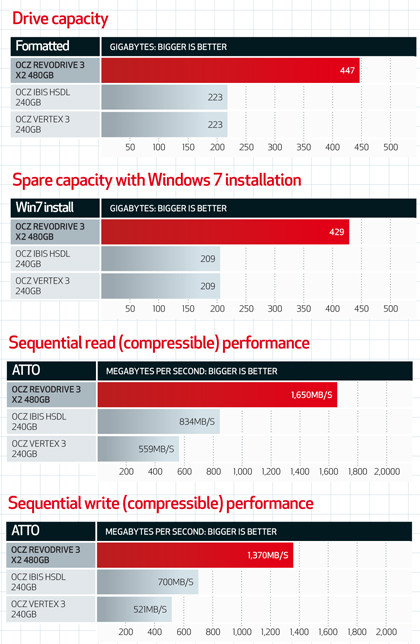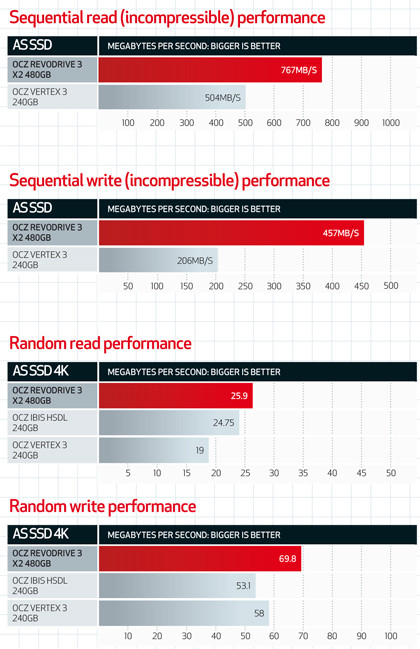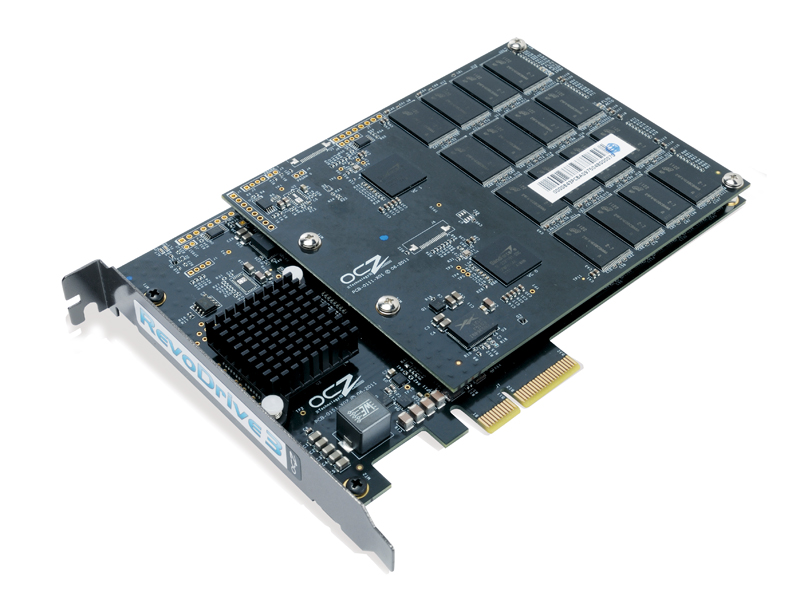Why you can trust TechRadar
Superlatives ahead

If it's unprecedented, intergalactic throughput you seek, look no further than the OCZ RevoDrive 3 X2 480GB. Regards sequential read and write performance, the numbers OCZ itself claims are spectacular at 1,500MB/s and 1,225MB/s. But our test results are even better at 1.65GB/s and 1.37GB/s. Think about those figures for a moment.
For starters, the RevoDrive murders the 1GB/s barrier and thus makes mass storage performance that rivals system memory seem a lot more plausible. But the gap between the claimed performance and our results is well over 100MB/s for both reads and writes. The RevoDrive is so fast, its deviation alone from claimed performance is in the same ballpark as the peak performance of an early SSD.
Similarly, these benchmarks make the RevoDrive as much as three times faster than the best available SATA SSDs. Fair to say, then, OCZ's PCI Express technology is a success. Elsewhere, however, the RevoDrive's performance is inevitably more mundane. At least, results like 767MB/s and 457MB/s seem mundane compared to the official performance claims.
We speak here of incompressible sequential performance, a metric which tends to be a weak spot for any drive based on a SandForce controller chip. That's because the impressive peak performance achieved by SandForce drives is partially achieved courtesy of data compression. Compressing data before pumping it into the flash chips means less bandwidth in and out. And that means faster transfer rates. Problem is, many if not most of the really data-intensive file types are incompressible, including movies and music.
But if there's an area where we have more serious concerns about the performance of the RevoDrive, it's random access. Much here depends upon the benchmark you choose to run. Use a test like I/O Meter, which generates perfect 4k files for random access tests and you'll see the RevoDrive come close to delivering on OCZ's claims of 200,000 IOPs.
However, perfectly formed 4k files aren't reflective of the messy business of real-world disk usage and access. In that context, a test like AS SSD's 4k benchmark gives a better idea of the worst case scenario. At 25.9MB/s and 65.8MB/s for reads and writes, the RevoDrive is barely any better than a single OCZ Vertex 3.
As for how all this translates into actual desktop performance, the answer is that the results are mixed. On the upside, the RevoDrive tears through game installations at a scarcely believable lick. It's more than twice as quick as a good single SSD.
Sign up for breaking news, reviews, opinion, top tech deals, and more.
However, unpacking .ZIP files reveals the limitations. The RevoDrive is slightly slower than a single Vertex 3. It's also worth remembering that the performance of the RevoDrive will often be limited by source or target destinations for data. Data rates between multiple drives in any PC are defined by the weakest link, not the fastest.
Before we consider how the RevoDrive performance and pricing place it in the broad constellation of SSDs currently, what are the practicalities of using a PCI-e -based board as opposed to a SATA drive?
In terms of installation, the RevoDrive couldn't be much easier. Okay, you'll need to crack open your PC's case – you can't run the drive externally like an eSATA drive. You'll also need to use the 'have disk' method when installing Windows 7. But that's a simple matter of dropping the driver onto a USB key before you start the installation process.
From there on, it's much the same as a standard SATA drive with two small exceptions. First, you'll have to suffer a new status screen within the system boot and post process, which slows start-up times by around three to five seconds. In our testing, the RevoDrive also ran hot, which indicates that there are potential problems with longevity and thermal management.
With all that in mind, should you buy OCZ's exotically priced RevoDrive 3 X2 480GB? If money ain't an object and you're a hands-on sort of PC user, the answer is a qualified yes.
Admittedly, it doesn't blow normal SSDs away by every test, but the overall picture is of a drive that at worst is as quick as anything out there and sometimes in a performance class of its own. In that sense, it's a classic big-money enthusiast component. It's not perfect, but it does deliver some outrageous performance figures.
TechRadar Labs



Must haz?
For everyone else, we're not so sure. The RevoDrive's performance in the nitty gritty random access workloads that make up so much of daily computing isn't as spectacular as the raw throughput numbers would have you believe.
Day to day, we doubt you'd notice the benefit over a conventional SSD. But the biggest issue is the lack of fully implemented TRIM support. OCZ has done all it can to enable TRIM on the RevoDrive. What's now required is an update for Windows 7 from Microsoft.
For now, it's unclear whether Win7 client OSes will ever be updated. And that means we can't give the RevoDrive an unreserved thumbs up.
Follow TechRadar Reviews on Twitter: http://twitter.com/techradarreview
Technology and cars. Increasingly the twain shall meet. Which is handy, because Jeremy (Twitter) is addicted to both. Long-time tech journalist, former editor of iCar magazine and incumbent car guru for T3 magazine, Jeremy reckons in-car technology is about to go thermonuclear. No, not exploding cars. That would be silly. And dangerous. But rather an explosive period of unprecedented innovation. Enjoy the ride.
